Generative AI (GenAI) is triggering disruption across industries, generating debate and exploration at all levels of private and public organizations, all the while moving at a rapid pace with maturing use cases.
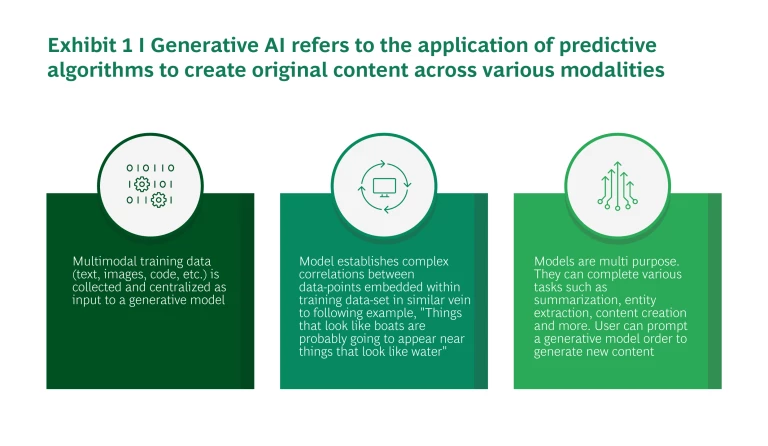
The technology has taken center stage in the Middle East as a key agenda item for senior leaders across organizations. As clear evidence of this, 93% of C-level executives in the region have expressed increasing investment in AI and GenAI technology during the ongoing year
The path to taking advantage of GenAI is broadly tailored to each organization, and the tech function – as a key owner of the technology agenda – is at the center of major opportunities. However, when 68% of Middle East executives also report a lack of guidance on AI & GenAI
Given the data-rich and technology-diverse nature of the tech function, and the promising use cases currently showing potential, Middle East CIOs/CTOs should more explicitly look at GenAI as their newest value creator.
AI-Powered Tech Transformation
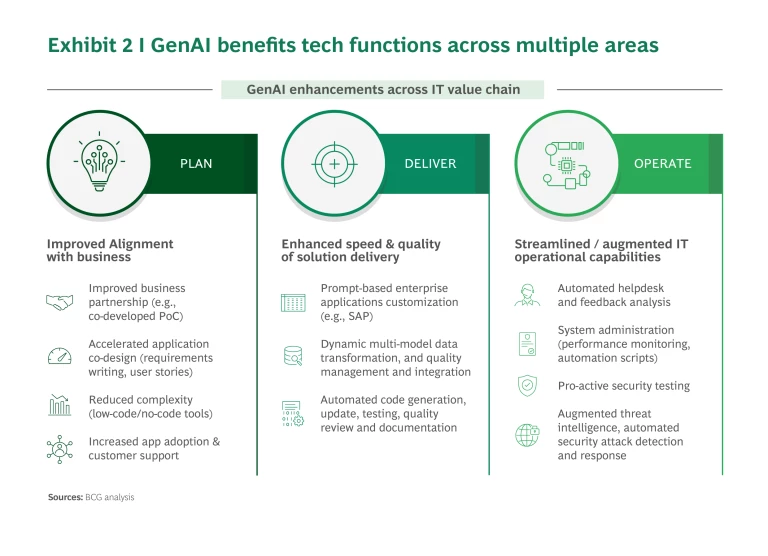
Large Language Models (LLMs) underlying GenAI – such as GPT-4 by OpenAI, Gemini by Google, and Claude by Anthropic – have shown impressive results when trained on vast quantities of data. The tech function domain makes GenAI’s job even easier because it relies on standardized and structured documents and artifacts, such as code, specifications, data models, tests, operations knowledge bases, user tickets, build scripts, and system logs, making it perfectly suited for the early application of GenAI systems.
GenAI’s impact will be felt across the plan-deliver-operate stages of the tech function value chain (see Exhibit 2). It will improve business-IT alignment by enabling rapid low-code/no-code prototyping and accelerating co-development of business requirements, user stories, and proof of concepts; enhance the quality and speed of application development, customization, legacy code update, and testing through automating code generation; as well as automate end-to-end IT operations processes (e.g., helpdesk troubleshooting) and augment cybersecurity capabilities (e.g., automated security testing, threat detection). GenAI is also capable of generating a multiplier effect: expanding access because it ‘understands’ data from a wide array of sources, thereby automating data cleansing, structuring, and management. This allows it to deliver significant improvements in data quality.
The pace at which GenAI is gaining adoption is unprecedented, with increasingly realizable benefits. Developers using GitHub Copilot, Microsoft’s AI-powered code completion tool, have reported accepting an average of 30% of the code suggestions generated by the tool, increasing over time. As tech functions across the business landscape leverage a growing array of off-the-shelf coder augmentation solutions, such as CodeWhisperer (Amazon), and Codey (Google), to boost efficiency and creativity, the productivity gains experienced are only expected to compound.
Beyond coding, GenAI enables business-tech interactions and ways of working along the solution's lifecycle that result in significant productivity gains. For example, off-the-shelf tools such as Jasper and AskEdith enable the generation of first-draft user stories and requirements, freeing up time that would have been spent by IT and business counterparts. Other use cases include, but are not limited to:
- Automating complex tasks and reducing dependencies on scarce talent
- Enabling automated documentation, ensuring the seamless retention and transfer of IT knowledge
- Enhancing project efficiency by learning, adapting to, and automating project constraints
- Mitigating code complexity and technical debt by leveraging smart optimization strategies
- Expediting workforce upskilling by delivering personalized and adaptive learning experiences
- Enhancing IT support through chatbot-driven self-services that utilize the advanced semantic understanding of an IT knowledge base
Tangible GenAI Opportunities for Middle East Businesses’ Tech Functions
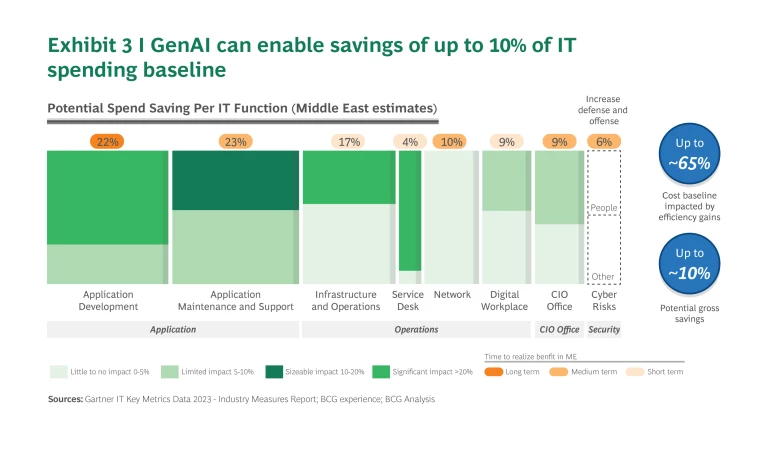
As shown in Exhibit 3, GenAI at tech functions in the Middle East can broadly impact up to 65% of IT spending, and overall deliver potential gross savings of up to 10% of the IT spending, with infrastructure and operations, service desks, and digital workplace tools being the most relevant areas for deployment in the short term.
The material value GenAI is expected to deliver for tech functions – and subsequently to businesses – introduces new and immediate imperatives for CIOs/CTOs who will need to manage four areas in parallel:
- Deploying GenAI technology to transform the technology base (i.e., updating the tech stack, selecting partners, and augmenting teams) at organizations
- Applying GenAI to the tech function: Enabling value for IT, e.g., transforming the software development lifecycle and enhancing data management practices
- Driving GenAI in the business: Identifying and enabling relevant business cases, to optimize operations and enable innovation
- Ensuring safe and responsible use of GenAI: Clearly defining ethical principles and guardrails and integrating responsible AI with existing governance and risk management practices
Key Challenges to Successful GenAI Adoption
The rapid evolution of GenAI technologies presents a transformative opportunity for tech functions globally, including in the Middle East. However, the journey towards embracing these opportunities is not without its challenges. Leadership often finds itself preoccupied with balancing build and run priorities, leaving little room to recognize or explore the potential value of GenAI. This is exacerbated further by competing 'no-regret' tech investments that promise immediate returns, as IT functions play capability catch up with ambitious business requirements.
Moreover, the path to GenAI adoption is hindered by underdeveloped data governance and management capabilities, which are crucial for the effective deployment and accuracy of GenAI applications. The tech sector also grapples with a scarcity of essential skills and faces lengthy hiring processes, stretching already thin resources even further.
Lastly, a lack of awareness and readiness for GenAI application can also bring forward internal resource challenges, like emerging a culture of mistrust or skepticism due to a lack of confidence about value/risk tradeoffs. A gap in understanding AI risk and how to mitigate will also expose functions to malpractice on ethical and safe AI integration.
Together, these barriers present a complex landscape that organizations must navigate to leverage the transformative potential of the technology. However, maneuvering around these obstacles and managing change will prove increasingly important in the future. As a technology that is quickly becoming a reality and changing the nature of how industries operate, the potential benefits of implementing GenAI systems will likely far outweigh the investment and efforts required to manage the change involved in implementing them.
How Can Tech Functions Get Started on Their GenAI Journeys?
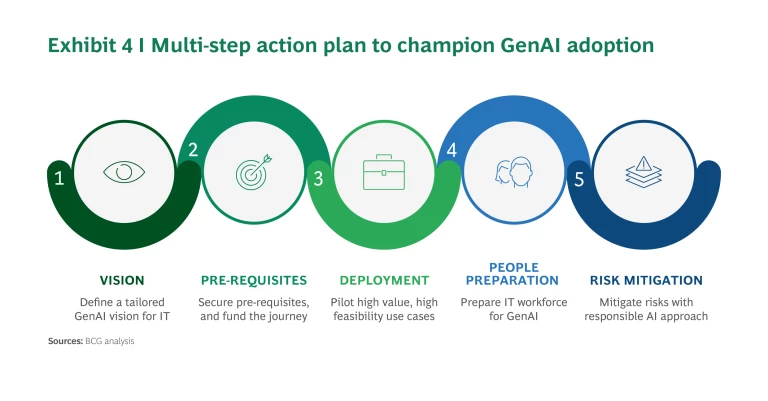
The action plan presented in Exhibit 4 can help tech functions realize the tremendous opportunities offered by GenAI:
- Make space for GenAI in your tech vision
The first step is to define where GenAI can have an early impact and how this impact can be scaled and spread across a tech function, based on the technology’s potential, as well as the company’s ambitions and starting point. - Secure pre-requisites and funding
GenAI represents a major IT transformation, which requires funding for the necessary changes in tooling, processes, and talent. Sufficient company-wide technical maturity also must be achieved prior to deployment, including a centralized code base, a well-documented configuration management database and knowledge base, and a lean software and DevOps toolchain. Our recommendation is to ‘walk first’ to justify securing sufficient funding, by incubating GenAI within IT and nurturing ‘ambassadors’ who can help build awareness, empower data governance, and promote responsible AI practices within the rest of the business. - Learn by doing- deployment
Translate the vision into a use case roadmap, prioritizing value and feasibility (Exhibit 5). Build traction by experimenting quickly on the most feasible use cases. Evaluate your data maturity and readiness, select and build your tech stack (e.g., LLM, orchestrator, hosting environment, Prompt library, knowledge Base, DevOps, and MLOps toolchain). Highlight results on high-value use cases. Derive and share key lessons from each experiment to improve future processes. - Prepare the IT workforce for GenAI
This will involve accommodating new skills, roles, and ways of working required and training teams for GenAI usage through masterclasses and certifications, as well as investments in change management and upskilling campaigns. - Mitigate risks with responsible AI
GenAI risks are relatively less cumbersome to measure and control in IT than in other functions, but they should not be left to chance. For example, Helpdesk chatbots may be susceptible to ‘hallucinations’ (falsehoods and fabrications) and bias from their training data sets. Even enterprise tiers with enhanced data protection can encounter restrictions from company-specific data privacy, regulatory, or compliance policies. IT will need independent tools and processes to measure quality, service level agreements, security risks, and user satisfaction.
The GenAI Case for Middle East Tech Functions
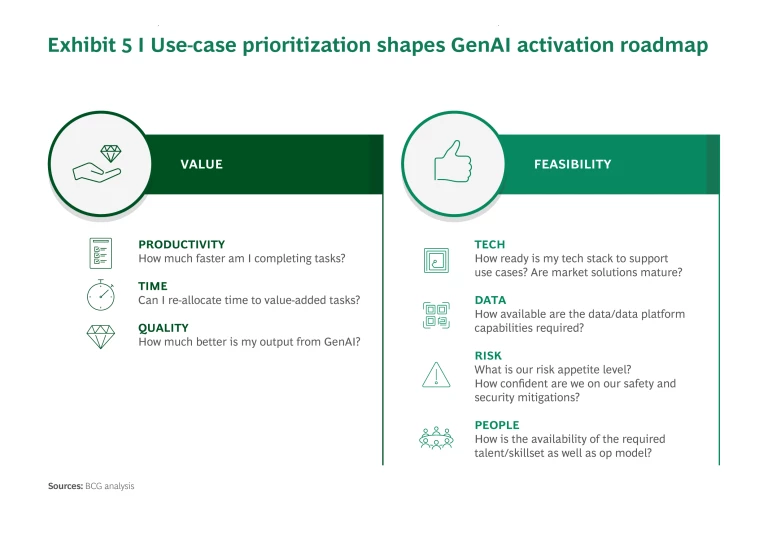
Understandably, the journey to implementing GenAI across the tech function of an organization can seem like a daunting move, particularly for many tech functions in the region with early-stage or developing capabilities, reflecting the recent push for in-house technology capabilities.
The case for the Middle East CIOs today is closely tied to spotting where organizations are positioned on the GenAI action roadmap above and reaching a rapid consensus on the need and benefit of integrating GenAI across their organizations. Encouragingly, nearly half of all organizations in the Middle East have already executed successful programmatic digital transformations
In addition to discerning a clear pathway to realize the promised value of GenAI, a key challenge lies in effectively scaling such transformations organization-wide, especially given the possibility of high initial costs associated with deploying such systems. In this regard, CIOs in the Middle East can benefit from a studied balance between value and feasibility in choosing where to invest (see exhibit 4).
GenAI has the potential for a multiplier-level step change in productivity and value. By trialing and implementing these solutions and tools within their own tech functions first, forward-looking CIOs will be well-positioned to gain the requisite knowledge and experience to help reap business value across their organizations.
In an age of disruption, overcoming adoption barriers will prove key in helping position tech functions so that they drive multipliers of value at ambitious organizations, setting them up for sustained success. Putting off GenAI until full capability maturity is achieved, however, might ultimately prove to be a costly move that will likely only enforce barriers to change in the long term.
Acknowledgements
Special thanks to Zakir Siddique who has contributed to this publication.









